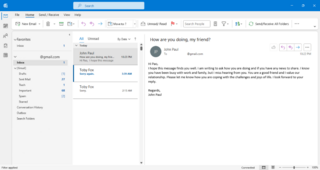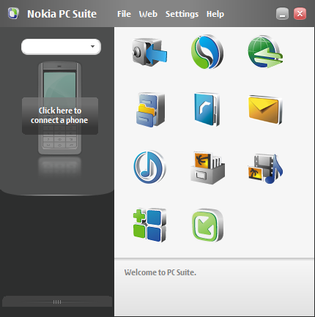
GNOME Evolution is the official personal information manager for GNOME. It has been an official part of GNOME since Evolution 2.0 was included with the GNOME 2.8 release in September 2004. It combines e-mail, address book, calendar, task list and note-taking features. Its user interface and functionality is similar to Microsoft Outlook. Evolution is free software licensed under the terms of the GNU Lesser General Public License (LGPL).

Microsoft Outlook is a personal information manager software system from Microsoft, available as a part of the Microsoft 365 software suites. Though primarily being popular as an email client for businesses, Outlook also includes functions such as calendaring, task managing, contact managing, note-taking, journal logging, web browsing, and RSS news aggregation.
OBEX is a communication protocol that facilitates the exchange of binary objects between devices. It is maintained by the Infrared Data Association but has also been adopted by the Bluetooth Special Interest Group and the SyncML wing of the Open Mobile Alliance (OMA). One of OBEX's earliest popular applications was in the Palm III. This PDA and its many successors use OBEX to exchange business cards, data, even applications.
SyncML is the former name for a platform-independent information synchronization standard. The project is currently referred to as Open Mobile Alliance Data Synchronization and Device Management. The purpose of SyncML is to offer an open standard as a replacement for existing data synchronization solutions, which have mostly been somewhat vendor-, application- or operating system specific. SyncML 1.0 specification was released on December 17, 2000, and 1.1 on February 26, 2002.

SOGo is an open source collaborative software (groupware) server with a focus on simplicity and scalability.
Calendaring Extensions to WebDAV, or CalDAV, is an Internet standard allowing a client to access and manage calendar data along with the ability to schedule meetings with users on the same or on remote servers. It lets multiple users in different locations share, search and synchronize calendar data. It extends the WebDAV specification and uses the iCalendar format for the calendar data. The access protocol is defined by RFC 4791. Extensions to CalDAV for scheduling are standardized as RFC 6638. The protocol is used by many important open-source applications.
Kolab is a free and open source groupware suite. It consists of the Kolab server and a wide variety of Kolab clients, including KDE PIM-Suite Kontact, Roundcube web frontend, Mozilla Thunderbird and Mozilla Lightning with SyncKolab extension and Microsoft Outlook with proprietary Kolab-Connector PlugIns.

Zimbra Collaboration, formerly known as the Zimbra Collaboration Suite (ZCS) before 2019, is a collaborative software suite that includes an email server and a web client.
Push email is an email system that provides an always-on capability, in which when new email arrives at the mail delivery agent (MDA), it is immediately, actively transferred (pushed) by the MDA to the mail user agent (MUA), also called the email client, so that the end-user can see incoming email immediately. This is in contrast with systems that check for new incoming mail every so often, on a schedule. Email clients include smartphones and, less strictly, IMAP personal computer mail applications.

Nokia PC Suite is a discontinued software package used to establish an interface between Nokia mobile devices and computers that run the Microsoft Windows operating system. Its first release was in 1997, originally called Nokia Data Suite. It was replaced by Nokia Suite and integrated into the Ovi service suite.
BlackBerry Enterprise Server designates the middleware software package that is part of the BlackBerry wireless platform supplied by BlackBerry Limited. The software plus service connects to messaging and collaboration software on enterprise networks to redirect emails and synchronize contacts and calendaring information between servers, desktop workstations, as well as mobile devices. Some third-party connectors exist, including Scalix, Zarafa, Zimbra, and the Google Apps BES Connector, although these are not supported by BlackBerry Limited. As of June 2018, BlackBerry Enterprise Server has been renamed to BlackBerry Unified Endpoint Manager (UEM).
OMA Device Management is a device management protocol specified by the Open Mobile Alliance (OMA) Device Management (DM) Working Group and the Data Synchronization (DS) Working Group. The current approved specification of OMA DM is version 1.2.1, the latest modifications to this version released in June 2008. The candidate release 2.0 was scheduled to be finalized in September 2013.

Windows Mobile Device Center is a synchronization software program developed by Microsoft, and the successor to ActiveSync. It is designed to synchronize various content including music, video, contacts, calendar events, web browser favorites, and other files between Windows Mobile devices and the Microsoft Windows operating system.
Microsoft Sync Framework is a data synchronization platform from Microsoft that can be used to synchronize data across multiple data stores. Sync Framework includes a transport-agnostic architecture, into which data store-specific synchronization providers, modelled on the ADO.NET data provider API, can be plugged in. Sync Framework can be used for offline access to data, by working against a cached set of data and submitting the changes to a master database in a batch, as well as to synchronize changes to a data source across all consumers and peer-to-peer synchronization of multiple data sources. Sync Framework features built-in capabilities for conflict detection – whether data to be changed has already been updated – and can flag them for manual inspection or use defined policies to try to resolve the conflict. Sync Services includes an embedded SQL Server Compact database to store metadata about the synchronization relationships as well as about each sync attempt. The Sync Framework API is surfaced both in managed code, for use with .NET Framework applications, as well as unmanaged code, for use with COM applications. It was scheduled to ship with Visual Studio 2008 in late November 2007.
Bynari is a defunct company based in Dallas, developing server and email software, mainly known for its Insight Family, similar to Microsoft Exchange Server with Outlook.
EGroupware is free open-source groupware software intended for businesses from small to enterprises. Its primary functions allow users to manage contacts, appointments, projects and to-do lists. The project releases its software under the terms of GNU General Public License (GPL).
Z-Push is a FOSS implementation of the Microsoft Exchange ActiveSync protocol which is used to synchronize email, personal contacts and other items between a central server and a mobile device.
vCard Extensions to WebDAV (CardDAV) is an address book client/server protocol designed to allow users to access and share contact data on a server.
Exchange ActiveSync is a proprietary protocol designed for the synchronization of email, contacts, calendar, tasks, and notes from a messaging server to a smartphone or other mobile devices. The protocol also provides mobile device management and policy controls. The protocol is based on XML. The mobile device communicates over HTTP or HTTPS.

GroupWise is a messaging and collaboration platform from Micro Focus that supports email, calendaring, personal information management, instant messaging, and document management. The GroupWise platform consists of desktop client software, which is available for Windows,, and the server software, which is supported on Windows Server and Linux.





